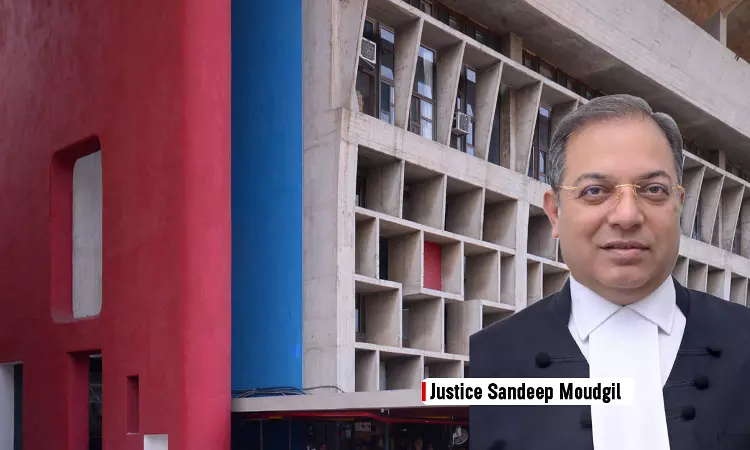- Home
- /
- High Courts
- /
- Punjab and Haryana High Court
- /
- 'Excessive, Civil Death': Punjab &...
'Excessive, Civil Death': Punjab & Haryana High Court On Dismissal Of Constable Who Took 2 Hour Nap While On Duty
Aiman J. Chishti
11 Sept 2025 7:13 PM IST
The Punjab and Haryana High Court has observed that the dismissal of a police constable—who had over fifteen years of service—for sleeping during duty timing for two hours, an excessive punishment, equating it to "civil death."The Court set aside the dismissal order of a Guard Duty under CRPF who reported on duty two hours late because he was found sleeping and refused to join the...
The Punjab and Haryana High Court has observed that the dismissal of a police constable—who had over fifteen years of service—for sleeping during duty timing for two hours, an excessive punishment, equating it to "civil death."
The Court set aside the dismissal order of a Guard Duty under CRPF who reported on duty two hours late because he was found sleeping and refused to join the duty .
Justice Sandeep Moudgil found that at the relevant time, the constable under the strain of his mother's grave illness, a fact supported by medical records. He was not absent from station, nor was the Magazine Station left unguarded, no allegation of intoxication has been established against the petitioner, the Court noted.
"The material placed on record discloses that the present petitioner, a constable of long standing, failed to report for duty and, when roused allegedly, did not immediately respond to his superior's command. Though the omission is blameworthy but to visit him with the civil death of removal from service, a sentence that extinguishes livelihood, erases a career of nearly fifteen years, and disregards a past of acknowledged bravery, is in our opinion, a punishment too disproportionate and non befitting the act of misconduct of the petitioner," said the judge.
Law Never Understood Discipline To Be Synonymous With Harshness
The Court further said that Discipline is the backbone of any armed or paramilitary force and a lapse in the performance of sensitive duties like Magazine Guard Duty cannot be brushed aside. Yet, the law has never understood discipline to be synonymous with harshness. Service law, like all facets of constitutional governance, must draw sustenance from the rule of law and from the principle that punishment must fit not merely the offence but also the offender.
Power To Punish Is Coupled With A Duty To Proportion
Justice Moudgil observed that the power to punish is coupled with a duty to proportion. The petitioner was charged under Section 11(1) of the CRPF Act, 1949 which places the misconduct attributed to him in the category of minor misconduct, amenable to censure or other lesser penalties as listed in the statutory provision.
"Worse still, the authorities split a single episode into two separate charges i.e. one of absence from duty and another of disobedience of orders although both arose from the same factual transaction. This amounts to an impermissible duplication of charges, which unfairly magnifies the misconduct," it added.
The bench said that it cannot overlook the fact that judiciary has repeatedly held that punishment must be commensurate with the gravity of misconduct, and dismissal for a single act of sleeping on or neglecting duty is excessive and violates principles of fairness and proportionality.
In the present case, the Court noted that though it is true that the petitioner had earlier been penalised on certain occasions, those penalties had already been suffered and could not be resurrected to aggravate the present punishment, and no material placed on record suggests that the petitioner was given opportunity to rebut the same.
Therefore, the Court opined that his earlier lapses cannot justify imposing excessive penalty for a single act of misconduct, particularly when his record also shows commendation for gallant service.
Justice Cannot Be Blind To Context
Justice Moudgil opined that Justice in the constitutional sense cannot blind to context.
The judge pointed that the petitioner was, at the relevant time, under the strain of his mother's grave illness, a fact supported by medical records.
"He was not absent from station, nor was the Magazine Station left unguarded, no allegation of intoxication has been established against the petitioner. Against this factual backdrop, the punishment of dismissal imposed upon the petitioner is shockingly disproportionate to the proved misconduct," the Court said.
Holding that the the quantum of "penalty is excessive, unreasonable, and unsustainable in law," the Court set aside the dismissal order.
Mr. Manish Prabhakar, Advocate for the petitioner
Ms. Alisha Arora, Advocate for the respondents.
Title: SUNIL MOHITE v. UNION OF INDIA AND OTHERS
Click here to read/download the order



